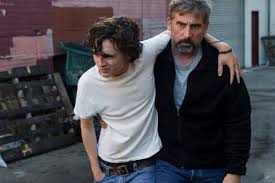I seem to have become a movie critic. A month ago I posted on Ben is Back and yesterday I watched A Beautiful Boy on a flight home from San Francisco. And what I get at the end of each movie is a big fat nothing. There is no conclusion, no understanding, no ground from which to move forward.
 With Ben is Back, there was Julia Roberts’ compelling angst, and now, with A Beautiful Boy (which I also read), we feel that intense heartbreak of a parent who can do nothing more to help.
With Ben is Back, there was Julia Roberts’ compelling angst, and now, with A Beautiful Boy (which I also read), we feel that intense heartbreak of a parent who can do nothing more to help.  Only to keep loving…and losing…as if his son had cancer or leprosy. I guess I’m mad and that’s why my words are coming out this way. There is something fundamentally wrong in these portrayals. Yes, they get the drama, the heartbreak, the power of drug highs. They get the agonizing schism between the teen or young adult lost in drugs and the (generally divorced) parents who still love their kid intensely. All that is worthwhile and important. But what they don’t get is the experience. They don’t even try to approximate, to estimate, to guess at what these young drug addicts are experiencing (other than deep sighs and stretches and rapturous smiles). Why is this so opaque?
Only to keep loving…and losing…as if his son had cancer or leprosy. I guess I’m mad and that’s why my words are coming out this way. There is something fundamentally wrong in these portrayals. Yes, they get the drama, the heartbreak, the power of drug highs. They get the agonizing schism between the teen or young adult lost in drugs and the (generally divorced) parents who still love their kid intensely. All that is worthwhile and important. But what they don’t get is the experience. They don’t even try to approximate, to estimate, to guess at what these young drug addicts are experiencing (other than deep sighs and stretches and rapturous smiles). Why is this so opaque?
 I mean, if we can create film after film about the Vietnam War and experience the shame, guilt, and horror of soldiers watching their friends die and their deepest values twisted inside out, why can’t we even come close to portraying — not what the parent is feeling — yes, that’s important too — but what the young addict is experiencing? What could be more dramatic than that? (And isn’t that supposed to be the crisis of our time?)
I mean, if we can create film after film about the Vietnam War and experience the shame, guilt, and horror of soldiers watching their friends die and their deepest values twisted inside out, why can’t we even come close to portraying — not what the parent is feeling — yes, that’s important too — but what the young addict is experiencing? What could be more dramatic than that? (And isn’t that supposed to be the crisis of our time?)
 With Ben and Nic, there are plenty of scenes that broadcast, almost prostitute, the sense of shame that these young men feel about their addictions and the deep hurt they cause their parents and siblings. Okay…shame. We get that addiction confers shame, which makes it harder to stop and harder to connect. But there’s so much more that’s missing. What is it that gets these kids to go back to their dealers and using buddies and half-empty girlfriends to do it again? To throw it all away, even after a year or more of “sobriety?”
With Ben and Nic, there are plenty of scenes that broadcast, almost prostitute, the sense of shame that these young men feel about their addictions and the deep hurt they cause their parents and siblings. Okay…shame. We get that addiction confers shame, which makes it harder to stop and harder to connect. But there’s so much more that’s missing. What is it that gets these kids to go back to their dealers and using buddies and half-empty girlfriends to do it again? To throw it all away, even after a year or more of “sobriety?”
In an online interview, Nic Sheff, the “boy” on whose story the book and movie are based, describes meth as providing “the feeling I’d been looking for my whole life.” We hear that a lot in stories of hard drug use (heroin and meth), and these movies actually provide skittery sci-fi sounds suggesting that the drugs are broadcasting an irresistible homing signal. But that’s way too easy. Rather than imagine that this was our singular goal since first grade, we need to look at the cluster of feelings that we have been trying to get away from.
 This word “sobriety” might be a way in. What feels so miserable about sobriety (the kind that’s required rather than chosen)? I can tell you, in case you’ve never been there. It’s the boredom, the emptiness, the contrivance, the feeling of being who you’re supposed to be…which requires leaving behind the compelling drive to explore your own identity, choices, and consciousness. Who in Hollywood tries to portray that? The intensely creative moment of throwing out the norms and choosing, at the risk of one’s own existence, to reach for moments of awareness defined completely on one’s own terms.
This word “sobriety” might be a way in. What feels so miserable about sobriety (the kind that’s required rather than chosen)? I can tell you, in case you’ve never been there. It’s the boredom, the emptiness, the contrivance, the feeling of being who you’re supposed to be…which requires leaving behind the compelling drive to explore your own identity, choices, and consciousness. Who in Hollywood tries to portray that? The intensely creative moment of throwing out the norms and choosing, at the risk of one’s own existence, to reach for moments of awareness defined completely on one’s own terms.
There’s nothing moral or immoral about it. Taking powerful drugs can be a creative act, often with dire consequences. It’s not about the skittering sci-fi sounds of what is supposedly happening to your brain. Or the kiss of thanatos that inspired Freud and the Velvet Underground both. It’s the reach…for something so very different…from the monotony of living in our TV-tailored culture and obeying the commandments of family and love without ever having created  either one. Yes, we want that. But at 18 or 20, we can’t create it. We can only rent that property from parents who settled there and established a home there. We can only copy, and please, and behave ourselves, trading our youthful energy for the security we could never find elsewhere. And guess what: that’s not enough.
either one. Yes, we want that. But at 18 or 20, we can’t create it. We can only rent that property from parents who settled there and established a home there. We can only copy, and please, and behave ourselves, trading our youthful energy for the security we could never find elsewhere. And guess what: that’s not enough.
So we find our own kind of creativity and culture: the powerful technology of present-day drugs and the immensely attractive inclusion of like-minded venturers…and that moment of going back to being entirely unbound…that’s what we seek, and often find. And sometimes that’s what destroys us…and perhaps our families too. It just disappoints me hugely that all the power and skill of Hollywood has not even ventured there, not even peered under that rock…at least not lately…in the black-and-white disease-minded culture of “you’re either one of us or you’re some unfortunate mutant.” What the fuck? We can do better than that.
(I’m aware, in re-reading this, that it’s only one slant. My target here is the middle-class confusion and emptiness that often promotes drug experimentation in teens. That’s the setting in both films. Intense socioeconomic hardships can also propel drug use, as can trauma, loss, depression, and other challenges. And yes, drugs can be addictive — which is a causal force in itself. These other drivers of addiction are discussed in many other posts by me and my guest contributors.)

Leave a Reply to Pam Cancel reply